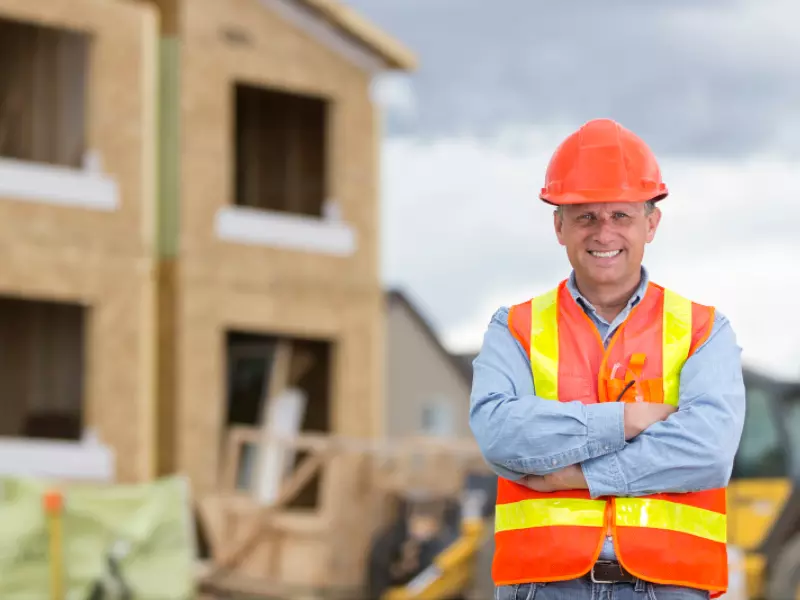
According to the National Association of Home Builders, on average, it takes 20+ contractors and subcontractors to construct a new residential home. To a custom home builder like Wells Custom Framers, this might seem pretty normal, but when looked at from the homeowner's point of view, this might seem excessive.
Are there many different kinds of contractors needed to build a home? Do they all do the same job, or are they specialized in certain kinds of tasks? To answer these questions, it is first important to understand what each type of contractor does.
Enter the General Contractor
First and foremost, the person running the entire show is a home building contractor, also known as a house construction contractor or general contractor. He or she is responsible for overseeing the construction project from start to finish. This includes, but is not limited to, the following:
- Estimating the costs of materials and manpower
- Hiring and managing subcontractors
- Coordinating the work done by the subcontractors
- Ensuring construction schedules are met
- Overseeing the entire construction process
- Ensuring the project is proceeding as per plan and exceeds the client's quality expectations
- Ensuring that all work done on the house construction project is up to code and meets all rules and regulations set forth by various government departments for health and safety
Given how important the General Contractor's role is in the entire house construction process, they must be able to communicate effectively, motivate, and manage the relationships with each one of the subcontractors hired as well as the homeowner and various government departments. At Wells Custom Framers, we make sure that the person from our team managing a house construction project has years of relevant experience under their belt, which is why we've built a hard-earned reputation for unmatched house construction quality across Western Massachusetts.

Let's take a look at some of the most common subcontractors that are typically hired for a house construction project.
What is a Subcontractor?
A home building subcontractor is an independent contractor who has a specialized set of skills related to a particular trade and performs specific tasks as part of the house construction project under the guidance of the General Contractor. As mentioned before, on average, it takes more than 20+ subcontractors to build a typical home
From a construction company's point of view, it makes more sense during a house construction project to hire people with the necessary experience for a specialized task rather than work with someone who has a generalized experience not related to the task at hand. Doing so cuts the time required for the task to be completed, ensures higher quality output, and is ultimately safer for the crew as well. This is where subcontractors come in.
Home Foundation:
The sort of foundation you'll require depends on the type of soil, the level of the water table, and the grade of backfill, among other factors. Whether it's a basement, slab, or posts, these subcontractors know how to build a sturdy support system for your home using the right procedures and materials.
Wood Framing:
After the home foundation has been set, residential wood framing subcontractors are responsible for putting up the home's "skeleton." This includes installing studs and other support framing members, as well as the roof trusses.
Drywall:
Drywall subcontractors are the ones responsible for putting up the home's "skin." This includes installing drywall sheets, taping the joints, and applying texture.
Masonry:
From home foundations to home exteriors, masonry subcontractors specialize in working with all kinds of stone, brick, and concrete. This can include everything from installing a home's foundation to putting up a beautiful natural stone fireplace surround.
Concrete:
Concrete subcontractors specialize in, you guessed it, concrete! This can include everything from home foundations to driveways, patios, and walkways.
Carpentry:
Carpentry is a general term that covers a wide range of home construction tasks. Carpentry subcontractors can be responsible for anything from installing cabinets to building
Windows and Doors:
As the name suggests, these home building contractors install windows and doors. In some cases, they might also be responsible for framing the openings for these doors and windows.
Siding:
Home siding contractors are responsible for installing the home's siding. This can be made from a variety of materials, including wood, aluminum, vinyl, or fiber cement.
Home Security System Installation:
Security experts are not only familiar with the finest locations for cameras, but also with the current security systems and how to integrate them into a connected home.
Carpeting:
Carpet installation might seem like a job that anyone can do, but there is more to it than meets the eye. Not only do they have to take measurements to cut the carpet perfectly, but they also have to install it without any wrinkles or bumps.
HVAC Installation:
Heating, ventilation, and air conditioning systems are critical for the comfort of a home's occupants. HVAC specialists not only have to install these systems, but they also have to ensure that they are properly integrated into the home's ductwork.
Roofing:
The roof is one of the most important parts of a home, which is why it must be installed by a professional. Roofing contractors not only have to install the roof, but they also have to ensure that it is properly ventilated and has the right slope to shed water effectively.
Electrical Wiring:
Electricians are responsible for installing the home's electrical wiring. This includes running the wires through the walls, ceilings, and floors of the home as well as connecting them to outlets, switches, and fixtures.
Home Automation Technology:
Home automation specialists are responsible for installing and configuring the home automation system. This includes integrating the system with the home's electrical and HVAC systems as well as installing sensors, controllers, and other devices.
Plumbing:
Plumbers are responsible for installing the home's plumbing system. This includes running water lines through the walls, floors, and ceilings of the home as well as connecting them to fixtures, appliances, and drains.
Flooring:
Flooring contractors are responsible for installing the home's flooring. This includes everything from hardwood floors to tile and carpet.
Painting:
Painters are responsible for painting the interior and exterior of the home. This includes preparing the surfaces to be painted, applying primer, and painting the home with the desired color scheme.
Kitchen Countertops:
Kitchen countertop contractors are responsible for installing the home's kitchen countertops. This can include everything from laminate to granite and quartz.
Garden & Property Fencing:
Fencing contractors are responsible for installing the home's fence. This can be made from a variety of materials, including wood, chain link, vinyl, and aluminum.
Landscaping:
Landscaping contractors are responsible for installing the home's landscaping. This can include everything from planting trees and shrubs to laying sod and installing irrigation.
Ceramic tiling:
Ceramic tile contractors are responsible for installing the home's ceramic tile. This can be used for floors, walls, countertops, and backsplashes.
Outdoor Decking:
Decking contractors are responsible for installing the home's deck. This can be made from a variety of materials, including wood, composite, and vinyl.
Garage Doors:
Garage door contractors are responsible for installing the home's garage doors. This can be a simple task or a complex one, depending on the type of garage door being installed.
Home Inspection:
Home inspectors are responsible for inspecting the home to ensure that it meets all safety and building codes. They will also provide a report that can be used by the home's owner to make repairs.
Conclusion
There are a variety of home building contractors that can be used for house construction. Each type of contractor has their area of expertise and they can all play an important role in the construction of a home. It is important to choose the right contractor for the job to ensure that the
